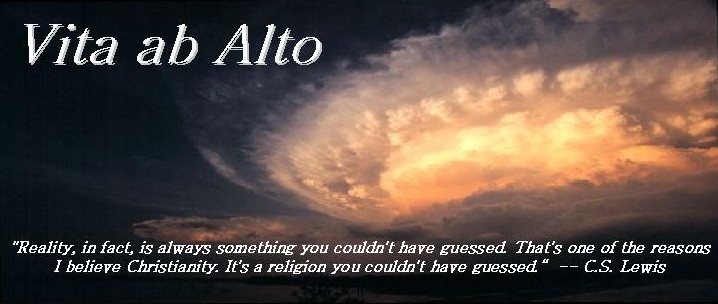Moral Relativism: Protestant and Catholic Perspectives


******
This is a "rebroadcast" and amalgamation of several earlier posts, making the entire conversation on relativism suitable for posting on Christian Carnival. I apologize for the length of the post, but I think all correspondents made good points (if I do say so myself). "Read the whole thing," as Glenn Reynolds would say.
--Monk
******
Here's a very interesting post on moral relativism, a subject I have blogged about many times, over at Deo Omnis Gloria. The post is written from a Catholic perspective and while I like its definitional clarity and agree with much of it (after all, most of my posts on the subject were written defending the last and current Popes), I disagree with some of its conclusions:
While the Catholic Church takes major steps to address the error of relativism the opposite is occurring within Protestantism.
In order to understand how moral relativism is rapidly growing in Protestantism it is important to point out the major defect of Protestantism. Although Protestantism, in itself holds to certain absolutes, most importantly that Jesus Christ is the Lord and Savior of the world, what that demands is completely left up to the relativistic interpretation of individual believers. In other words, by holding to Sola Scriptura or "the Bible alone" it naturally follows that each individual must be both the interpreter and definer of what truth is as he/she understands it in the Word of God. Reading requires interpretation, so the question of who has the authority to interpret can only find an answer in the individual believer. Individual interpretation has led to denominationalism, which is in direct contradiction of Sacred Scripture. Historically and biblically, we know this to be an absolute truth. The relativistic aspect of Protestantism has directly resulted in the birth of such religions as Mormonism, the Jehovah Witnesses, Seventh-Day Adventists, and others who compromise the very nature and identity of God Himself. It has also, brought about the evolution of "Christian" moral relativism. So what is the future of Protestantism? The reality of the situation leads us to the conclusion that Protestantism will continue down the path of denominationalism and moral relativism. I believe many of the non-denominational churches have seen this, but rather than seek the Church Christ founded, they have simply broken away from their original churches, thus compounding the "denominational" problem.
Umm...no, but thank you for playing!
This is a perfectly understandable Catholic perspective and the critique contains elements of truth--relativism does infect much of Protestantism, along with much of Catholicism, and the Catholic episcopate has done an admirable job (at least at the highest levels) of offering adamant philosophical and theological opposition to relativism's influence. But it is dangerous from several perspectives to think that Protestantism is a fatally flawed relativist endeavor and that Roman Catholicism contains the sole repository of unadulterated absolute truth. For one, it belies the reason the Reformation started in the first place--the idea that the church, through its own institutional concerns and worldly corruption, had forsaken the absolute teaching of Christ and his Church as revealed in Scripture. The early reformers were just that--loyal members of the church who sought to fight its manifest corruptions--the fruits of "relativism" and worldliness at the time--and not radicals who sought (as adherents to relativistic materialist philosophies do today) "anything goes." Sola scriptura means one source of guidance, and that guidance does not change with the whim of any worldly institution.
Yes, some Proddy denominations did drink the koolaid of relativism and then went back to drain the pitcher (Episcopalians, anyone? Of course, many of them maintain that they're Catholic...) But this is a problem that afflicts all of modern man (or at least all those living in the developed world), including all denominations within the Visible Body of Christ. I'm not sure how a Catholic can seriously maintain that relativism is primarily a Protestant problem when "liberation theology" was all the rage in the 80s (a thing PJPII and BXVI (when he was "God's Rottweiler") helped squash) and when the RC church is undergoing its sordid priestly pederasty scandal--a direct product of the kind of corrupting relativistic influences Joe at DOG rightly condemns. It's a universal problem and we don't help the Visible Body deal with it when the foot kicks mud at the hand or the hand flings it the other way. All Christians are in this struggle against a rival and hostile religion together.
Yes, it is also correct to say that the Reformed Protestant belief is that individual believers "interpret" scripture, in the sense that the individual believer needs no intermediary other that the Holy Spirit to derive the inspiration God divinely placed there. No one person--no layman, priest, bishop, or Pope--is potentially any more inspired by the Holy Spirit than any other. This does not mean that a Pope isn't--he's just not inspired exclusively, nor does he enjoy any special benefit of inspiration because of his office. Individuals interpreting the scripture always do so correctly only through the mechanism of the Holy Spirit. And it is always individuals who interpret scripture, by the way--whether they are representatives for other Christians through church office or just ordinary people reading the Bible. The Holy Spirit addresses us each in our individual souls, not as members of the "Catholic," "Protestant," "bourgeois," "proletarian," "white," "black," or any other group. At some juncture interpretation always comes down to some individual acting (one hopes) through the Holy Spirit. Now, you may choose to entrust that relationship to one person (a Pope) who you believe to be uniquely qualified, but that's a choice as potentially dangerous as any other in terms of adulterating the Word. That individual or small aristocracy of individuals will have institutional interests as worldly church administrators that may corrupt their judgment--this is true of Protestant churches too, of course). But it explains why the church was in such need of reform by the time a means to handily disseminate scripture to regular people was invented. (That technology was also an impetus behind the reformation, as were advances in scholarship on the Greek New Testament.)
A swarm of denominations entails its own dangers, one of them being factionalism, but you one can't pretend that this is a problem unique to Protestantism. There are many factions within Roman Catholicism, as the somewhat tepid reaction of US bishops to the election of BXVI attests. Each denomination, however small or large, is doing God's right work (as God gives them to see the right), as some part of the Visible Body. Some forms of ministry speak better to certain people than others--I don't like big, anonymous churches, for instance, regardless of denomination.
That's how Protestants deal with the issue philosophically: I don't have a right to say to another Christian who wishes to worship a way different than mine that his way is wrong unless, of course, it clearly contradicts the fundamental elements of scripture that Christians cannot compromise on, like the unique perfection of Christ and His atoning death and resurrection. The church was in agreement on what these were even before there was Holy Scripture, when bishops had to rely exclusively on the Holy Spirit's direct inspiration, as Paul's letters (the first parts of the canon written down) attest. Part of the danger is that some groups will fall away entirely, like Mormons or Unitarian Universalists did. But that happened when the Western church was united, too. The way of dealing with the apostates just differed.
BTW (1), Mormonism was founded in a part of the US known at the time as "the burnt-over district" because of the fervor and frequency of evangelical and fundamentalist revivals--most groups accepting a much stricter interpretation of canon than Catholicism--and yet it fell away altogether, into something that is not Christian, but, ironically, looks a lot like the Catholic church: small aristocracy of uniquely-endowed priests answering to a single appointed-for-life authority who claims direct spiritual descent from a divinely-appointed founder. BTW (2), Seventh-Day Adventists have some unusual ideas, but they are Christians if you examine the bulk of their doctrine. BTW (3), what price the "Western" and "Eastern" churches? That's a pretty long-standing division; both sides proclaim exclusive apostolic succession. What gives?
The sad fact is that all these and more are divisions within the Church. They separate us and give us reason for discord, inhibiting our working together. I wish a true reunion was possible. Unfortunately, I don't think that will happen until Christ returns: divisions reflect part of our sinful nature--a nature Papists and Proddies shared in pretty much equal proportions last time I looked. If you don't believe that, then you haven't been to enough church council meetings. (Witness this wonderful poem by one of my favorite young ministers).
Joe's "bottom line" concerning relativism really is (the bottom line, that is):
In conclusion, relativism can only be countered by absolute truth. Therefore, the Church Christ founded is the answer to stopping relativism, for it remains the "pillar and bulwark of truth."
Indeed it is, but we have this pesky "through a glass darkly" problem, which led to relativism (that original sin was in some respects a manifestation of) in the first place. We seem to see "the Church Christ founded" in relatively different terms. Catholics see it as the Roman Catholic Church exclusively (although the "Greek Orthodox, while not in 'full union'...possess a 'valid' tradition, through the presence of apostolic succession). Many others see it as the entire Visible Body of Christ.
The sad truth is that factionalism and relativism are both part of our sinful nature and no group of Christians is uniquely immune to their dangers.
Monk
_______________________________________
Update:
Joe at Deo Omnis Gloria responds:
1) Liberation Theology - although promulgated by several South and Central America bishops, has never been professed as an "alternative" for Catholic believers by the Magisterium of the Catholic Church. So again, it is a relativistic teaching of "individuals" but not of the teaching authority of the Catholic Church.
2) The working of the Holy Spirit in each Christian does not rule out the "exclusive" nature of authoritative interpretation that has been given to those who have succeeded the Apostles (i.e. the Pope and those bishops in union with him) as manifested in Matt 16:19. So I, as a believer, can correctly understand and interpret what Sacred Scripture is saying, BUT as soon as that "personal" interpretation fails to be in accordance with the teaching of the Catholic Church, the Church given the authority to "bind and loose," then I can rest assured that "I" am mistaken. A truth of the Catholic faith that Luther and the other Reformers blatantly missed.
3) Denominationalism and the Catholic Church - Despite the half-hearted reaction of certain Catholic bishops to the election of Pope Benedict XVI, they have not separated themselves from the Catholic Church, in any way, shape, or form other than a "personal" preference.
4) Sects and Catholicism - Do you really understand what Mormons believe? Mormonism's theological beliefs could hardly be mistaken for the fundamental beliefs of Catholicism. But let me make my point once more....these sects are a direct result of the relativism that exists within the Protestant ideal. The founders of all these sects were Protestants who sincerely believed that they were interpreting Sacred Scripture correctly and that God was directly calling them to found their "individual" churches.
5) "Right work" - Let's look at one topic - Baptism. There are as many varieties of teachings on the purpose and administration of Baptism as there are denominations! Is there a "true" teaching on Baptism, an "absolute" teaching on Baptism? Or is each way a "right work" as you would call it?
6) "Western" and "Eastern" churches - Neither the Roman Catholic Church nor the Greek Orthodox Church denies the other's claim to apostolic succession, in fact the opposite is true. The Catholic Church "fully" recognizes the apostolic succession of the Greek Orthodox Church, that is why the Catholic Church teaches that their sacraments are "fully" valid.
7) Division vs. Denominationalism - look for an article on this topic this weekend on DeoOmnisGloria.com. I will say this there is a "distinct" difference between the two.
In Christ,
Joe
Good words, brother. I agree with much that you say, but still take issue with your characterization of relativism as the central motivation of Protestantism.
Nonetheless, I hesitate to debate doctrine with you. If you really want to, I'll roll up my sleeves and get to it, but correspondent Veep's very appropriate (inspired?) comment pulls me back:
"We do, however, speak a message of wisdom among the mature, but not the wisdom of this age or of the rulers of this age, who are coming to nothing. No, we speak of God's secret wisdom, a wisdom that has been hidden and that God destined for our glory before time began. None of the rulers of this age understood it, for if they had, they would not have crucified the Lord of glory. However, as it is written:
No eye has seen,
no ear has heard,
no mind has conceived
what God has prepared for those
who love him
but God has revealed it to us by his Spirit.
The Spirit searches all things, even the deep things of God. For who among men knows the thoughts of a man except the man's spirit within him? In the same way no one knows the thoughts of God except the Spirit of God. We have not received the spirit of the world but the Spirit who is from God, that we may understand what God has freely given us. This is what we speak, not in words taught us by human wisdom but in words taught by the Spirit, expressing spiritual truths in spiritual words. The man without the Spirit does not accept the things that come from the Spirit of God, for they are foolishness to him, and he cannot understand them, because they are spiritually discerned. The spiritual man makes judgments about all things, but he himself is not subject to any man's judgment:
For who has known the mind of the
Lord that he may instruct him?
But we have the mind of Christ"
-1 Corinthians 2:6-16
In HIS Love,
Veep
Several related verses come to mind, too:
"Everything is lawful," but not everything is beneficial. "Everything is lawful," but not everything builds up.
1 Cor 10:23
and
Let us then pursue what leads to peace and to building up one another.
Rom 14:19
Reasonable people can disagree about specifics of doctrine, but--I, at least, believe--we do no credit to the deep things of God and we do not edify others if we argue amongst ourselves concerning those specifics, especially in the face of manifest challenges to the entire Visible Body of Christ--Catholic and Protestant alike. Relativism is a challenge to the entire visible church and is not a problem unique to any denomination. I admire much of what the Catholic episcopate is doing to counter it, but it's also being fought within mainstream Protestantism, as I am experiencing first-hand. Continue the good fight from your end and we will move ahead together.
Monk
PS: In do understand what Mormons teach (I have been a target of intended conversion and have had several good Mormon friends) and, whatever it may be, it ain't Christianity. I meant no knock against the Catholic Church--it's just ironic (as I believe I said) that the group chose an organizational structure something like that of the Catholic Church. Mormon doctrine has nothing to do with the genuinely Christian doctrine taught as Catholicism, even if--as a sola scriptura sort of Protestant--I believe the latter to be somewhat adulterated. If it looked like I was trying to imply an equivalence between Catholic and Mormon theology, I apologize--that was not my intention.



